- Home
- Jane Peart
Daring Bride Page 2
Daring Bride Read online
Page 2
“And what did Evalee wear?”
“I declare, she did look every inch the countess she was becoming—in name, at least. White satin and a diamond tiara.”
“Diamond?” Scott asked. “I thought you said the groom was penniless.”
“Oh, he is. So are they all. But it seems the only thing they managed to take out of the country was their jewels. One of Andre’s aunties, Countess Vera, confided to me that they all had sewn them into their corsets when escaping.” Suddenly Garnet began to chuckle.
“What’s funny, Aunt Garnet?” Scott asked.
“I was just thinking of the discussion Dru and I had before the wedding. Knowing the financial situation of Andre’s family, we decided to dress simply and not wear any jewelry. But when we got to the church, we saw that even though their gowns were rather out of style, we were completely outshone by the Oblenskov ladies, who were aglitter with diamonds, sapphires, emeralds.”
“Does Evalee seem happy?” was Jill’s next question.
“She should be, if all the many toasts wishing them a long and happy marriage have anything to do with it,” Garnet said. Then she added, “I don’t think I ever saw a young couple more in love.”
After that the conversation went on to other things, but Garnet’s description of Evalee’s wedding had made Jill pensive.
She knew what it was to be suddenly bereft of everything, just as the Oblenskovs were. The world war had also wiped out her former life. She hoped that in spite of differences in background, religion, and nationality, Andre and Evalee had found true love and would have a long, happy life together.
“It’s disgraceful,” Garnet was saying to Scott. “Hasn’t she any sense of the propriety of such a thing? The Montrose name is one of the oldest in this county. And to advertise to give riding lessons! It’s a wonder Kip has allowed it.”
“Kip allow it?” Scott echoed her statement sarcastically. “No one tells Cara what to do. She’s as self-willed as ever, Aunt Garnet. Even mother and father learned that.”
“Well, nevertheless, I intend to have a talk with her and give her my opinion.”
“I’d leave it alone, Aunt Garnet. It won’t be appreciated,” advised Scott.
“It’s my duty, Scott. Since your mother chose to move to California, there’s no one to direct your sister.”
Scott rolled his eyes upward. “Take my word for it, Aunt Garnet, you’ll be wasting your breath—besides making Cara angry.”
Garnet ignored him placidly. “Now, about Bryanne”
At this point Jill rose and excused herself, saying she had to check with the cook in the kitchen about dinner, and left the room.
She should have known, having worked for Garnet Devlin as a companion-governess to Bryanne before her marriage to Scott. Garnet always stirred things up. Talk about a storm brewing! Confronting Cara was sowing a whirlwind. And Garnet would probably reap a whirlwind.
However, Jill was determined to try to prevent Garnet from intimidating Bryanne. That is, if she could.
That night at the dinner table at Montclair, Nicole felt anxious. Uncle Kip’s flyer friends often ate meals with them. Usually it didn’t make any difference. They practically ignored her and Luc, except for some teasing remarks when they first came to the table. Most of all, the men just talked to each other, swapping airplane stories, detailing exciting moments of near misses, describing close calls as if they were fun.
Niki shot a quick glance at Cara. Tante always pretended interest, laughed at the right times, but sometimes Niki had seen a glaze come over her eyes, a faraway look. Niki, who knew her so well, suspected she was thinking of something else. The ponies, perhaps. She was probably thinking about the riding students that were having a difficult time, and what methods she might use to help them. Tante was wonderful with kids. Too bad she and Uncle Kip hadn’t had some of their own. Maybe then Tante wouldn’t be so protective, so possessive.
But what worried Niki tonight was that Aunt Kitty was here. Niki knew Kitty hated talk of flying because it reminded her of the war. Niki knew all about Kitty’s story. She had been a nurse in France at the battlefields. She had fallen in love with a soldier, and he had been horribly wounded. They had lived in the darling little cottage in the woods until he died. Niki thought it was terribly romantic but very sad. She wished Uncle Kip would remember that and talk about something different. Niki wasn’t sure what else he was really interested in except planes and flying.
She looked over at Luc. He liked to hear his father and his friends tell stories. He made model planes and had them hanging from the ceiling in his bedroom. Niki tried to catch his eye but he was listening to the men.
Niki’s glance shifted to Tante and she felt a small jolt of alarm. Tante looked nervous and was darting quick looks toward her sister. Aunt Kitty had grown very pale. She was crumbling her roll to pieces and wasn’t eating. Niki felt her stomach tighten.
Suddenly Aunt Kitty burst out, “Didn’t you men have enough of this kind of talk in the war? Or are you still living your glory days, when you were the knights of the air?” She shook her head. Her eyes were bright with anger. Niki had never seen her like this. “I can’t understand how you could have forgotten your friends who were shot down and died in fiery crashes—or worse, lived for a few agonizing weeks afterward.”
Kip looked startled at first, then flushed a deep red. His jaw clenched. “Kitty, listen—,” he began, but she wouldn’t let him stop her.
“No, Kip, you listen! And your friends should hear this, too! I saw men brought into the hospital with third-degree burns over half their bodies. Can you even imagine what excruciating pain that is? They were in shock, screaming for somebody to put them out of their agony. I can’t forget that. And you shouldn’t be able to, either. How can you take the risks you take every time you go up in a plane? Don’t you care about your wife and children?”
“Kitty, please,” Cara said in a low voice. “We have guests.”
But Kitty whirled around and demanded. “And how about you, Cara? You drove an ambulance. You were with me when we loaded mortally wounded men into ambulances. How can you let Kip do this?”
“It’s not war, Kitty,” Kip said. “We’re planning for the future of aeronautics.”
“Future? That’s a laugh. I’ve been to Europe, just a year ago. I don’t think Germany and Italy are building their factories and making airplanes for fun. I think they’re planning for another war.”
“That’s ridiculous, Kitty,” argued Kip. “You don’t know what you’re talking about. You’ve been taken in by all these isolationists. People that are paranoid about—”
“Paranoid? You’re the ones who are crazy.” Kitty pushed back her chair and got up. “I can’t listen to any more of this.”
An audible sob caught in her throat and she rushed out of the dining room. A stunned silence followed her departure. No one moved or said anything for a full minute.
Beau and Tim looked down at their plates. Then Kip broke the uneasy pall that had fallen over the table. “You’ll have to forgive Kitty. She was, as she said, a field nurse. Lost her husband…” His voice trailed off. His lips were pressed together tightly He glanced at Cara, and the look that passed between them was cold. The two other men murmured something.
Then Cara spoke. “Niki, you and Luc please clear the table. Then you can go upstairs and listen to your radio or read until bedtime.”
Luc did his part of the job in a slapdash manner, piling the plates on the drain board haphazardly. Then he went back into the dining room, where the men were hotly debating the need for America to build up an air force.
Feeling sick and unhappy about the scene, Niki used the back stairway from the kitchen to her bedroom. As she passed the guest room, she heard raised voices. She halted. She couldn’t help overhearing. Tante and Aunt Kitty were having a terrible quarrel.
Frightened yet fascinated, she unabashedly listened.
“I’m sorry if I embarrassed you, Cara, but I
don’t understand how you can sit by and let Kip do this.”
“Do what? He’s doing what he does best. He’s an experienced, skilled pilot. He’s teaching young men to fly.”
“For what? To go off to war, kill other young men, and be killed? Is that something to be proud of?”
“That’s not fair, Kitty. There’s no war. Kip and men like Beau and Tim see a great future in the air. They’re thinking of starting a mail service with trained pilots and—”
“Do you really believe that, Cara?” Kitty demanded. “Anyone with a brain can see what’s ahead if those strutting egomaniacs in Italy and Germany have their way. What they did in Ethiopia was barbaric….” She looked at her twin. “Or don’t you read the papers? Are you so isolated in your cocoon in rural Virginia, occupied with your ponies and your children, that you don’t pay attention to what’s happening in the rest of the world? If you did, you’d know how dangerous what Kip and the others are doing is.”
Cara was insulted. “I told you, Kitty, they’re simply instructors—”
“I can’t believe you can’t see it! Kip’s never got over being a hero, an ace.”
“That’s not only unfair, it’s unkind,” Cara retorted. At first all she had wanted to do was calm Kitty down, but now she was angry.
“Just wait and see. The bugles blow and he’s off, ready for the glory of it all.” Kitty’s hands were clenched, the knuckles white. “Oh, I cannot believe that someone—anyone—who’s seen the horrors of war firsthand could ever have any part in it.” She shivered and hugged her arms close to her body, as though she were physically cold. “For you to stand by and encourage him…” She looked at her sister aghast. “If it weren’t for the last terrible war, my life—and yours too, Cara—would be so different. My darling Richard—and Owen—would not have had to die.”
“Kitty—,” began Cara, frustrated.
“Don’t!” Kitty put both hands over her ears, turned away. “Don’t say any more. I don’t want to hear it.” She whirled around, faced her sister, trembling. “What does it take to get through to you? I’m shocked that you aren’t as incensed as I am. Don’t you see where all this is leading? Don’t you read anything but Horse Digest?”
Niki heard Tante respond in an angry voice, then loud footsteps on the uncarpeted floor. Afraid of being caught eavesdropping, she ran down the hall to her own room. Shakily she let out the breath she hadn’t realized she had been holding. It was scary and awful to hear the twin sisters talk to each other like that.
Kitty was too distressed to sleep. She had always hated any kind of confrontation, avoided it—often to her own regret at being perhaps too passive. But to quarrel so with her twin! She and Cara had differed often on many things, but this was the worst argument of their lives.
She loved Cara even as herself. It was a physical pain to be apart from her physically, emotionally, and spiritually. But there was no way she could reconcile their opposite viewpoints on this most vital matter. She would have to—as she had had to do once before—separate from her sister, follow her own direction no matter what….
Kitty closed her eyes and pressed clenched fists against her mouth, reliving the horror she could usually keep at bay. Wasted pain, men who needn’t have died. Lives, bodies, minds, souls, wrecked. The world would plunge headlong back into it all, unless someone cried, “Stop the insanity!”
She had to try. Even if she was the only voice lifted up against the battle cries of those using patriotism to justify killing. She remembered Richard’s long agony after the parades, the flag waving, the medals. She had sat up nights with him, holding him as he fought against begging for the relief of the narcotic that she had the power to give. They had wept together, prayed together. She had to tell others—for Richard’s sake and for the sake of all those she had seen suffer and die in the human slaughter—that there was no glory in war.
Kitty shuddered. Pain and anger, if turned inward, festered. You had to deal with emotional wounds. What could she do? One thing she knew—she couldn’t stay here much longer. She didn’t want to face Kip in the morning. Or talk to Cara. They’d already said too much. They had said things they would probably both be sorry for later—but of that she wasn’t sure. Her own words had been her heart’s cry. She knew her feelings wouldn’t change.
She dreaded facing Kip. But she had to stay until after Aunt Garnet’s birthday party. It would be too awkward, too awful, to leave before then. To let everyone know the rift that had come between her sister and her.
Kitty heard the grandfather clock downstairs strike five. She reached for her robe, wrapped it around herself, and went to the window. The early-morning sky was lavender streaked with pink. In the distance, half hidden by the dense foliage of the trees leading to it, she could see the faint outline of the little house. Eden Cottage. She hadn’t lived there since Richard’s death, couldn’t bear to. She had rented it a few times but mostly it stood empty. Slowly the thought came. While she was in Mayfield, she would move out to Eden Cottage. That way she could avoid another confrontation with Gara or Kip. Yes, that’s what she would do. It would give her the space she needed, the time to think, to plan what she could do.
chapter
3
Arbordale, Virginia
Avalon
ALTHOUGH BRYANNE MONTROSE did not have the cameo beauty people admired in her sister, Lynette Maynard, she was very attractive. Her features were just irregular enough to make her face interesting. She had lovely blue eyes, a sweet, generous mouth, and shiny red-gold hair worn in a fashionable “pageboy” style. At the moment, her expression was all concentration as her hands moved quickly in the clay. At a knock on the studio door, her eyebrows drew together in a frown. Without looking away from the figure of the child she was molding, she called, “Come in!”
“How’s it going, little Sis?”
She turned to look at her tall brother as he entered. Gareth was handsome in a rugged sort of way. Dressed in a denim work shirt, worn corduroys, and boots, he could easily have been taken for an ordinary workman. He set down a tray with a coffee pot and two mugs and came to stand behind her.
“Oh, I don’t know. I’m about to smash it all down and start over!” she replied, half joking, half serious. Spotting the tray, she exclaimed, “Oh, great! Just what I needed. Thanks!”
“A little sustenance to stimulate the creative artist,” he said, smiling, and he filled both mugs.
“I don’t know about that,” she sighed. “Creative? Not really. I’m using Mama’s sketches, you know. Oh, good. I didn’t realize I was hungry.” She reached for one of the oatmeal-raisin cookies on the plate.
“You’ve been out here working for hours.” Gareth handed her a steaming mug, then studied the model on the pedestal. “I think it’s good. In fact, very good, Brynie.”
Bryanne sat back on the high stool and looked critically at it. “Do you truly think so? Mama’s sketches are so delicate, but when I try to translate them into clay, they look so chunky, so—”
“It’s funny that Mama never painted. She drew so well.”
“Imagine us finding these after…” Bryanne shook her head. “I mean, Papa didn’t even know she made so many drawings of us when we were children.”
“She always wanted him to be the center, the star.” Gareth’s smile was a bit rueful. “She didn’t want to take anything away from him. She did her tapestries. That was a safe place for her to indulge her creativity.”
“I guess you’re right,” Bryanne said, nodding. She took a bite of her cookie and asked, “What were you doing all day?”
“Mulching, hoeing, getting the ground ready for spring.”
“Farmer Jones!” she teased.
He grinned. “I guess you could call me that.”
Bryanne smiled. She adored her older brother, admired him for being such an individual. He had resisted all the family’s pleas, suggestions, and entreaties to finish college, to go into law or medicine. Instead, he had opted to live at t
heir family home, Avalon, which stood on a small island near Arbordale, a town located fifteen miles from Mayfield. He had restored the house after it had stood empty for years. Ever since their mother had lost her life in the Titanic disaster, their father, Jeff Montrose, had abandoned it.
On his own, Gareth had studied botany. He had learned how to grow fruits and vegetables, how to take care of the trees and the fertile land on the island. Now he had a thriving landscape gardening business. He was doing what he wanted, what he loved best, in the place he loved best. Of course, they both loved Avalon—it was the place where they had experienced a magical childhood.
Gareth finished his coffee, replaced his mug on the tray, and said to Bryanne, “You’d better clean up here, go home, and get ready. Grandmother’s party at Montclair is this evening.”
“Oh, I nearly forgot,” Bryanne gasped. At her brother’s skeptical look she amended, “Not about Grandmother! Who could forget her?” She dimpled mischievously. “It’s just that when I’m working, everything gets forgotten. Time just disappears. But truthfully, I’m not especially looking forward to this evening. She’ll probably come at me again about going back to Birchfields with her.”
“And you don’t want to.”
“It’s not that I don’t love her, Gareth, you know that. And I know she’s getting old and is probably lonely in that big house all alone. But…” She paused. “When I’m with her, I become a child again. At least in her eyes. She can’t help it. After all, I was only five when Mama died and Grandmother took over. But I’m not a child anymore.” Her eyes suddenly became brilliant with tears. Gareth knew she was thinking about Sean. An understanding silence fell between them.

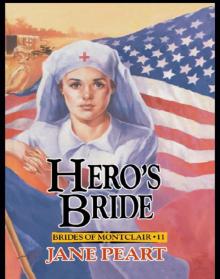 Hero's Bride
Hero's Bride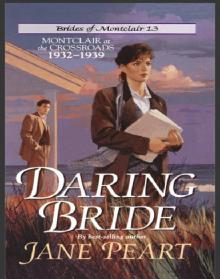 Daring Bride
Daring Bride Runaway Heart
Runaway Heart Promise of the Valley
Promise of the Valley Gallant Bride
Gallant Bride The Pledge, Value
The Pledge, Value Senator's Bride
Senator's Bride Valiant Bride
Valiant Bride Shadow Bride
Shadow Bride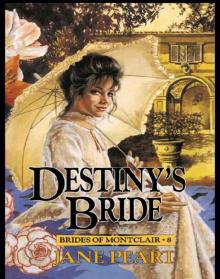 Destiny's Bride
Destiny's Bride A Tangled Web
A Tangled Web Folly's Bride
Folly's Bride The Promise
The Promise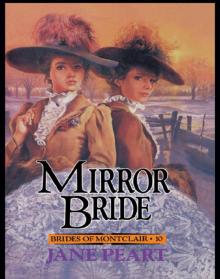 Mirror Bride
Mirror Bride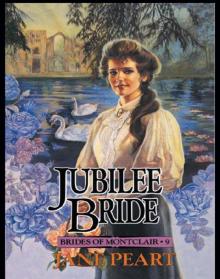 Jubilee Bride
Jubilee Bride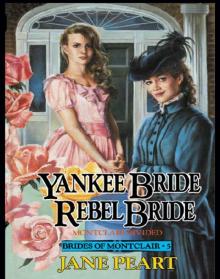 Yankee Bride / Rebel Bride
Yankee Bride / Rebel Bride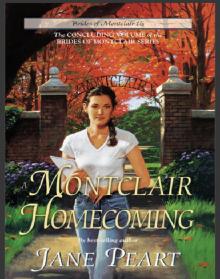 A Montclair Homecoming
A Montclair Homecoming Fortune's Bride
Fortune's Bride Undaunted Spirit
Undaunted Spirit Love Takes Flight
Love Takes Flight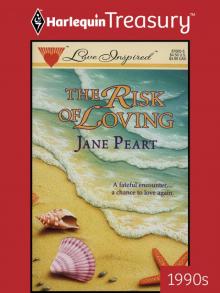 The Risk of Loving
The Risk of Loving The Pattern
The Pattern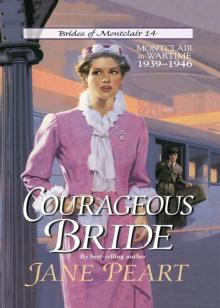 Courageous Bride
Courageous Bride